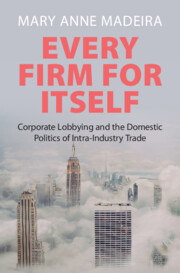
- Coming soon
- Publisher:
- Cambridge University Press
- Expected online publication date:
- July 2025
- Print publication year:
- 2025
- Online ISBN:
- 9781009651271

Economists have modelled the economic rationale for intra-industry trade, yet political scientists largely have neglected it until recently. Every Firm for Itself explores how dramatic shifts in the way countries trade have radically changed trade politics in the US and EU. It explores how electorally minded policymakers respond to heavy lobbying by powerful corporations and provide trade policies that further advantage these large firms. It explains puzzling empirical phenomena such as the rise of individual firm lobbying, the decline of broad trade coalitions, the decline of labor union activity in trade politics, and the rising public backlash to globalization due to trade politics becoming increasingly dominated by large firms. With an approach that connects economics and politics, this book shows how contemporary trading patterns among rich countries undermine longstanding coalitions and industry associations that once successfully represented large and small firms alike.
‘International trade has risen to the top of the world’s political and policy agendas. This makes it especially important to understand the politics of trade policy, especially in the developed countries that dominate the international trading system. In Every Firm for Itself, Mary Anne Madeira highlights the centrality of intra-industry trade to today’s international economy. She draws upon modern firm-based trade theory to argue that intra-industry and intra-firm trade have changed the nature of trade politics, and applies her argument to the United States and the European Union. The book is essential reading for anyone who wants to understand contemporary trade politics and policy.’
Jeff Frieden - Columbia University
‘Madeira moves us beyond factoral and sectoral models to explore the firm-specific political implications of ‘new new’ trade theory. Her subtle and sophisticated analysis convincingly resolves such puzzles as why lobbying is one-sidedly pro-trade, why non-tariff barriers rose even as tariffs declined, and - not least - how seemingly innocuous intra-industry trade has provoked rage against elites. Madeira’s impressive book is a ‘must-read’ for all students of international political economy.’
Ron Rogowski - University of California, Los Angeles
 Loading metrics...
Loading metrics...
* Views captured on Cambridge Core between #date#. This data will be updated every 24 hours.
Usage data cannot currently be displayed.